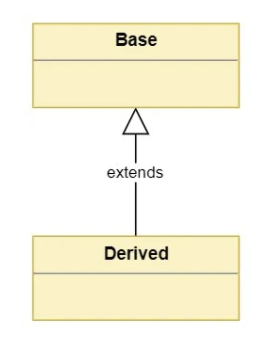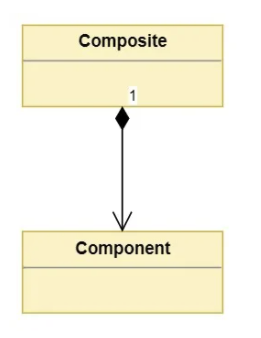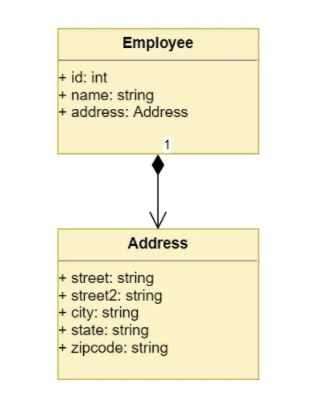python Inheritance vs Composition

이 글은 이 자료(https://realpython.com/inheritance-composition-python/)를 정리한 것입니다.
What are Inheritance and Composition
inheritance

- horse class가 animal class상속받음.(because horse is an animal).
- 이때 코드에서 모든 animal class는 horse class로 대체될 수 있어야 함.(Liskov substitution principle)
Composition
- Composite has a Component
- UML에서 숫자 1은 instance 수를 의미한다.

python inheritance 개요
- 파이썬에서 모든 것은 object다. modules, class, function, 전부 다.
- 상속은 객체 지향 프로그래밍 언어에서 필수.
- 파이썬은 다중상속을 지원하는 몇 안되는 언어 중 하나이다.
- 파이썬을 사용한다면 본인도 모르는 사이에 이미 상속을 사용하고 있는 것이다.
The Object Super class
- dir는 list of all the members를 return한다.
- myClass에 특별한 members를 정의하지 않았음에도 여러 값이 출력되는 이유는 클래스가 기본적으로 object를 상속받기 때문이다.
- 그 증거로 dir의 값이 Myclass와 object가 거의 같다.(
__dict__,__weakref__정도만 다르다)
class MyClass:
pass
c = MyClass()
print(dir(c))['__class__', '__delattr__', '__dict__', '__dir__', '__doc__', '__eq__', '__format__', '__ge__', '__getattribute__', '__gt__', '__hash__', '__init__', '__init_subclass__', '__le__', '__lt__', '__module__', '__ne__', '__new__', '__reduce__', '__reduce_ex__', '__repr__', '__setattr__', '__sizeof__', '__str__', '__subclasshook__', '__weakref__']
obj = object()
print(dir(obj))
['__class__', '__delattr__', '__dir__', '__doc__', '__eq__', '__format__', '__ge__', '__getattribute__', '__gt__', '__hash__', '__init__', '__init_subclass__', '__le__', '__lt__', '__ne__', '__new__', '__reduce__', '__reduce_ex__', '__repr__', '__setattr__', '__sizeof__', '__str__', '__subclasshook__']class Myclass:와 class Myclass(object):는 결국 같다.- 굳이 후자처럼 할 필요는 없음. (파이썬 2에서는 후자처럼 해야 했다고 함)
Exception
- 파이썬에서 모든 클래스는 object를 상속 받는데, exception은 예외다.
- BaseException은 에러정의를 위한 클래스로, 새로운 에러 타입을 만들기 위해서는 이 클래스 혹은 이 클래스를 상속받은 클래스를 상속받아야 한다.
- 예시 1. (object 상속)
class MyError:
pass
raise MyError
Traceback (most recent call last):
File "class_test.py", line 15, in <module>
raise MyError
TypeError: exceptions must derive from BaseException
- 예시 2. (Exception 상속)
class MyError(Exception):
pass
raise MyError
Traceback (most recent call last):
File "class_test.py", line 15, in <module>
raise MyError
__main__.MyErrorclass 상속 예시
class PayrollSystem:
def calculate_payroll(self, employees):
print('Calculating Payroll')
print('===================')
for employee in employees:
print(f'Payroll for: {employee.id} - {employee.name}')
print(f'- Check amount: {employee.calculate_payroll()}')
print('')
class Employee:
def __init__(self, id, name):
self.id = id
self.name = name
class SalaryEmployee(Employee):
def __init__(self, id, name, weekly_salary):
super().__init__(id, name)
self.weekly_salary = weekly_salary
def calculate_payroll(self):
return self.weekly_salary
class HourlyEmployee(Employee):
def __init__(self, id, name, hours_worked, hour_rate):
super().__init__(id, name)
self.hours_worked = hours_worked
self.hour_rate = hour_rate
def calculate_payroll(self):
return self.hours_worked * self.hour_rate
class CommissionEmployee(SalaryEmployee):
def __init__(self, id, name, weekly_salary, commission):
super().__init__(id, name, weekly_salary)
self.commission = commission
def calculate_payroll(self):
fixed = super().calculate_payroll()
return fixed + self.commission
salary_employee = hr.SalaryEmployee(1, 'John Smith', 1500)
hourly_employee = hr.HourlyEmployee(2, 'Jane Doe', 40, 15)
commission_employee = hr.CommissionEmployee(3, 'Kevin Bacon', 1000, 250)
payroll_system = hr.PayrollSystem()
payroll_system.calculate_payroll([
salary_employee,
hourly_employee,
commission_employee
])
Calculating Payroll
===================
Payroll for: 1 - John Smith
- Check amount: 1500
Payroll for: 2 - Jane Doe
- Check amount: 600
Payroll for: 3 - Kevin Bacon
- Check amount: 1250

- 문제: employee객체를 caculate_payroll 메서드가 없기 때문에 employee객체를 만들어 PayrollSystem에 돌리면 에러가 난다.
>>> employee = hr.Employee(1, 'Invalid')
>>> payroll_system = hr.PayrollSystem()
>>> payroll_system.calculate_payroll([employee])
Payroll for: 1 - Invalid
Traceback (most recent call last):
File "<stdin>", line 1, in <module>
File "/hr.py", line 39, in calculate_payroll
print(f'- Check amount: {employee.calculate_payroll()}')
AttributeError: 'Employee' object has no attribute 'calculate_payroll'해결: Employee클래스를 Abstract Base Class로 만든다.
Abstract Base Classes in Python
- abstract class는 상속만을 위해 사용된다.
- 즉, abstract class는 인스턴스화 되지 않는다.
- abc module을 사용해 abstract class를 만든다.
from abc import ABC, abstractmethod
class Employee(ABC):
def __init__(self, id, name):
self.id = id
self.name = name
@abstractmethod
def calculate_payroll(self):
pass- 위 코드로 인해 두가지 효과가 생긴다.
- Employee클래스의 인스턴스화 방지
- Employee클래스를 상속받은 클래스는 abstractmethod를 override해야 함.
>>> import hr
>>> employee = hr.Employee(1, 'abstract')
Traceback (most recent call last):
File "<stdin>", line 1, in <module>
TypeError: Can't instantiate abstract class Employee with abstract methods
calculate_payroll- 실제 Employee클래스를 인스턴스화 하면 에러가 나는데, abstractmethod가 오버라이드 되지 않았기 때문이다.
Implementation Inheritance vs Interface Inheritance
이해안됨
The Class Explosion Problem
Inheriting Multiple Classes
Composition in Python
- Composition은 oo design개념으로 has a 관계로 표현된다.
- composite class가 component 클래스를 갖는다.
- 즉, composite class는 다른 클래스의 component를 갖는다.
- composite class는 component class의 인터페이스를 상속받는 대신에 그 구현만 재사용 할 수 있게 해준다.
- composition는 두 클래스를 loosely coupled하게 해준다.(장점)
- 어느 한 클래스가 변경되도 상대에게 거의 영향을 주지 않기 때문에 코드를 유연하게 해준다.
- inheritance vs composition 디자인 중에서 후자가 보통 더 유연하다.
- 기존 employee클래스에서 init에 썼던 id, name도 composition이다.(잘 납득 안됨)
# In contacts.py
class Address:
def __init__(self, street, city, state, zipcode, street2=''):
self.street = street
self.street2 = street2
self.city = city
self.state = state
self.zipcode = zipcode
def __str__(self):
lines = [self.street]
if self.street2:
lines.append(self.street2)
lines.append(f'{self.city}, {self.state} {self.zipcode}')
return '\n'.join(lines)# In employees.py
class Employee:
def __init__(self, id, name):
self.id = id
self.name = name
self.address = None
# In hr.py
class PayrollSystem:
def calculate_payroll(self, employees):
print('Calculating Payroll')
print('===================')
for employee in employees:
print(f'Payroll for: {employee.id} - {employee.name}')
print(f'- Check amount: {employee.calculate_payroll()}')
if employee.address:
print('- Sent to:')
print(employee.address)
print('')# In program.py
import hr
import employees
import productivity
import contacts
manager = employees.Manager(1, 'Mary Poppins', 3000)
manager.address = contacts.Address(
'121 Admin Rd',
'Concord',
'NH',
'03301'
)
secretary = employees.Secretary(2, 'John Smith', 1500)
secretary.address = contacts.Address(
'67 Paperwork Ave.',
'Manchester',
'NH',
'03101'
)
sales_guy = employees.SalesPerson(3, 'Kevin Bacon', 1000, 250)
factory_worker = employees.FactoryWorker(4, 'Jane Doe', 40, 15)
temporary_secretary = employees.TemporarySecretary(5, 'Robin Williams', 40, 9)
employees = [
manager,
secretary,
sales_guy,
factory_worker,
temporary_secretary,
]
productivity_system = productivity.ProductivitySystem()
productivity_system.track(employees, 40)
payroll_system = hr.PayrollSystem()
payroll_system.calculate_payroll(employees)$ python program.py
Tracking Employee Productivity
==============================
Mary Poppins: screams and yells for {hours} hours.
John Smith: expends {hours} hours doing office paperwork.
Kevin Bacon: expends {hours} hours on the phone.
Jane Doe: manufactures gadgets for {hours} hours.
Robin Williams: expends {hours} hours doing office paperwork.
Calculating Payroll
===================
Payroll for: 1 - Mary Poppins
- Check amount: 3000
- Sent to:
121 Admin Rd
Concord, NH 03301
Payroll for: 2 - John Smith
- Check amount: 1500
- Sent to:
67 Paperwork Ave.
Manchester, NH 03101
Payroll for: 3 - Kevin Bacon
- Check amount: 1250
Payroll for: 4 - Jane Doe
- Check amount: 600
Payroll for: 5 - Robin Williams
- Check amount: 360
- Employee class는 Address object에 대해 알 필요 없이 Address의 implementation을 사용하고 있다. so flexible.
- Address의 class를 바꿔도 Emplyee에는 거의 영향이 안간다.
